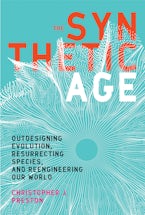The Synthetic Age is a powerful exposé of our ability to play nature and outperform evolution. This well-written and accessible book reminds us that humanity must accompany its ever-expanding technical prowess with a greater sense of responsibility of planetary proportions.
Calestous Juma, Professor, Harvard Kennedy School; author of Innovation and Its Enemies: Why People Resist New Technologies
Preston's thorough and engaging exploration of the many ways that our species has learned to control the natural world, from manipulating molecules to reorganizing ecosystems to controlling the climate, provides a compelling argument in favor of renaming the present epoch the Synthetic Age. The book is a fascinating combination of history, science, and ethics that asks us to consider what we value most in nature and in our own humanity.
Beth Shapiro, Professor, Physical and Biological Sciences, University of California, Santa Cruz; author of How to Clone a Mammoth
Preston thoroughly examines the promises and the perils of the forthcoming Synthetic Age. But I fear—more than he does—the prospect of living an artificial life on a denatured planet. I concede that we face a Semi-Anthropocene, a Symbiotic Age, hoping to keep the natural basics on a wonderland Earth.
Holmes Rolston, Colorado State University
Christopher Preston is a philosopher who writes for you and me about the most important development in human history—the remaking of the planet from top to bottom, or rather from bottom to top. In the midst of distressing upheavals, he counsels and inspires calm engagement in the decisions that are upon us.
Albert Borgmann, Regents Professor Emeritus of Philosophy, University of Montana; author of Real American Ethics and Technology and the Character of Contemporary Life
Whether you are a techno-optimist or deeply skeptical of technological fixes to environmental problems, Preston's overview of emerging technologies and call for a broad-based, truly democratic decision-making process is sure to resonate. In the Anthropocene, humans have a responsibility to care for our planet with collective, conscious intention. Preston makes clear the stakes involved and the decisions that lie ahead. We all must ask ourselves where our own values lie.
Emma Marris, author of Rambunctious Garden: Saving Nature in a Post-Wild World
Preston's book is an excellent spur and contribution to this necessary debate....Highly recommended.
Environmental Values
The Synthetic Age succeeds quite brilliantly in its goals. In providing clear, engaging explanations, often with an effective use of humor, Preston offers non-specialist readers a useful understanding of technological advances that are often hidden behind paywalls or impenetrable thickets of jargon. Preston has made thoughtful choices in terms of his audience: his intended readers may appreciate the fluid readability and concise length of the text, while scientists may disagree with the simplifications or chafe at the lack of footnotes or other forms of citation through much of the book. Similarly, scholars in the environmental humanities may feel the disconnect between the text's supposed neutrality and its unexamined biases. Ultimately, Preston's position as a non-scientist is a strength and demonstrates the interdisciplinarity and democracy essential to consciously choosing a new age that reflects the best that our species has to offer.
Minding Nature

Winner of the 2018 Nautilus Award in the Ecology and Environment category.



